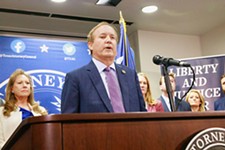What You Need to Know About U.S. Senate and House Races in Texas
Early voting in Texas starts Feb. 18, 2020. Here's the view from atop your Texas primary ballot.
By Michael King, Fri., Dec. 6, 2019
It's almost time to vote.
Although Texans voted only a month ago – the Nov. 5 constitutional referendum (etc.) election – as we go to press this first week of December, early voting in the 2020 Texas primaries is only a couple of months away. It runs Feb. 18-28, relatively early in the national cycle. Texans will begin voting after the Iowa caucuses (Feb. 3) and the New Hampshire primary (Feb. 11), but before the Nevada caucuses (Feb. 22) and election day in South Carolina (Feb. 29). Nationally, the 2020 primaries – particularly the Democratic primaries of most interest to Travis County voters (and Chronicle readers) – are generally more front-loaded than ever, and with most local voters expected to vote early, it's already time to bone up on the candidates jockeying for party nominations.
Because Texas is now "in play" – that is, much more competitive for Democratic challengers, top to bottom, than it has been for quite a while – that's also meant that more Democratic candidates are filing for offices long thought unattainable. That's true from top to bottom – this week, we're focused on the top of the ballot, the contests for U.S. Senate and House seats, where more would-be nominees are filing, with either conceivable chances of winning the party's nomination or else gaining name recognition for the long game of future returns. (The last day to file is Dec. 9, so there could be more to come.)
U.S. Senate: Taking on Big John
According to Federal Election Commission filings as of Dec. 2, there are 11 Democrats, two Libertarians, and five Republicans running for Senate. (An Austin footnote: perennial candidate Ricardo Turullols-Bonilla has also filed, as an independent.)
Three-term GOP incumbent John Cornyn faces Dallas investment manager Mark Yancey (running slightly to Cornyn's left on environmental policy and gun control) and East Texan Dwayne Stovall (running as a "constitutional conservative"), as well as two challengers who have raised no money as of the last finance filing deadline Sept. 30. Neither Yancey nor Stovall has sufficient resources to run a statewide campaign, and neither represents a serious threat to Cornyn's incumbency or financial war chest (nearly $11 million cash-on-hand as of Sept. 30).
Funding is also the first test for viable Democratic challengers, and five of the 11 declared Dems arguably have sufficient resources to run statewide: former U.S. Rep. Chris Bell, Houston City Council Member Amanda Edwards, veteran and author MJ Hegar, Latina activist Cristina Tzintzún Ramirez, and Dallas state Sen. Royce West. Bell was the Democratic challenger to governor Rick Perry in 2006, and has run several lesser races since; he has the most meager financial arsenal, having raised just over $200,000 (COH a little over $111,000). At the other end, current front-runner Hegar has raised more than $2 million, and as of Sept. 30 had $894,000 – more than twice Edwards, her nearest competitor in fundraising.
Hegar had a running start on the group; having run a surprisingly successful race against Rep. John Carter of Round Rock in 2018 (losing by 3%), observers have suggested she could have easily won a rematch (or forced Carter into retirement, joining the "Texodus" of fleeing GOP congressmen). But when both Beto O'Rourke and Wendy Davis passed on Senate campaigns, Hegar perceived a vacuum at the top of the Texas ballot and decided to take on Cornyn instead. In 2018, with the help of a viral campaign video that highlighted her experience in combat as well as her fight for women's equality in the military, she captured the attention of a national audience, which has continued to fuel her statewide run. Thus far, she has persistently attacked Cornyn as out of touch with Texans and beholden to corporate interests – indirectly implying that her path to the Democratic nomination is secure.
A September UT/Texas Tribune poll suggested that few voters were yet focused on the primaries. Although Hegar led other candidates as a voting choice with 11%, she was second to West in name recognition (22% to 21%), with Bell at 20% and the others strung out behind. (Among voting choices, "Haven't thought about it enough to have an opinion" was way out in front – 53% – with another 13% shrugging, "Don't know.") A November poll conducted by UT-Tyler reflected much closer (but still low) numbers overall. Tzintzún Ramirez was in the lead at 9.4%, and the other four were within two points – with a margin of error of nearly 5%, making all the numbers suspect. In short, it seems much too early to know if there's an actual Democratic front-runner.
With only a couple of months to make statewide impressions, Hegar, West, and Bell presumably begin with an initial edge. West, who's served in the Texas Senate since 1993, has a considerable base of support in Dallas and among party regulars – several Central Texas officials held a November fundraiser for him at the home of state Rep. Sheryl Cole, D-Austin, with other hosts including Travis County Commissioner Jeff Travillion and Reps. Celia Israel and Gina Hinojosa. Asked about her endorsement of West, Hinojosa said it was a result of working with him at the Legislature, particularly on "gun safety legislation and equity in education." While she was not ready to predict a primary outcome in a competitive field, she added cheerfully that in any case, "Texas will have a Democratic senator."
Bell, who represented southwest Houston in Congress, shares a Space City base with Edwards, who holds one of Houston's at-large council seats. Bell had 24% name recognition, Edwards 16% in the UT/Tribune poll, although they were essentially tied in single digits for voting support. Hegar, West, and Edwards are likely to be described as "centrists" or "moderates" in terms of national Democratic politics: e.g., expanding the Affordable Care Act rather than Medicare for All, advocating progress on environmental protection and climate change without endorsing the Green New Deal. Bell tracks to their left on those issues, as do Austin favorite Tzintzún Ramirez and Houston activist Sema Hernandez (who lost to O'Rourke in the 2018 Senate primary). The latter have both embraced Medicare for All and the Green New Deal, the current touchstones of the "progressive" wing of the party.
Hernandez, a Houston leader in the Poor People's Campaign, has tied her campaign more closely to presidential candidate Bernie Sanders. She and Tzintzún Ramirez were essentially tied in both name recognition and preference in that September poll (Hernandez did not place in the UT-Tyler poll). But having raised only a few thousand dollars as of last quarter ($3,900 COH), without additional resources it's not clear that Hernandez can hope to run a statewide race. By contrast, Tzintzún Ramirez has built two statewide organizations – Workers Defense Project and Jolt! (aimed at building Latinx participation in elections) – and her roots in the union movement have enabled greater effectiveness at fundraising (she's raised a half million overall, and retained $225,000 as of Sept. 30).
Along with Hernandez, behind the five-member pack of favorites are several longshots, including Beaumont Rev. Michael Cooper and Midland Council Member John Love. As late as November, folks still imagined that O'Rourke or either Julián or Joaquin Castro might enter the race – a fantasy suggesting something about Democratic enthusiasm for the existing field. It's early, yes – but now that we've entered the holiday season, the candidates have just eight interrupted weeks to carve out tangible presences, sufficient to make an effective statewide appeal to voters heading to the polls in mid-February.
It's worth noting in passing that voter turnout – among early voters and on election day – will be heavily influenced by the campaign strength, real or perceived, of the folks at the very top of the ticket. The Democratic presidential field remains too wide and disparate to yet get a sense of what those effects might be – especially now that O'Rourke, who commanded double-digit support in Texas polling, has exited that race.
U.S. Congress: The Austin Six
Readers will recall, once again, that due to extreme Republican gerrymandering, six congressional districts encompass some part of the city of Austin, but none is anchored (by population) here: All but one – TX-35 – is held by a GOP incumbent, and TX-35, anchored in northeast San Antonio and running up along I-35 to Austin, is also a consequence of gerrymandering: "packed" with sufficient Democratic voters to keep them out of neighboring districts where they might reduce GOP majorities. (Accordingly, TX-35 has been held by Rep. Lloyd Doggett since 2013 – the third different district of his 25-year congressional career – and whatever else happens, will be so again.)
Of the five remaining districts, at least three are likely to host competitive Democratic primary races. TX-10, the Austin-to-Houston district currently held by eight-term GOP incumbent Michael McCaul, was put in play by Democratic challenger Mike Siegel in 2018, when he reduced what had been McCaul's customary double-digit victory margins to just four points. TX-21, which like TX-35 stretches from Austin to San Antonio but also reaches far west into the Hill Country, was held by 16-term Republican Lamar Smith, who retired before the 2018 campaign. He was succeeded by former Ted Cruz staffer and hard-right firebrand Chip Roy, who narrowly defeated Democrat Joseph Kopser (a less than three-point margin), suggesting that this district is also in play. TX-31, the most compact of this group, consists of part of Bell and all of Williamson County (and thus includes a portion of Austin); it featured the 2018 campaign that brought MJ Hegar to prominence, and got her within three points of now nine-term incumbent John Carter.
TX-10: Taking on McCaul
This cycle, there are three Dems running for the TX-10 nomination, all from the Austin area (as is McCaul) despite the district's eastward tilt: Siegel, a former Austin city attorney and teacher; Pritesh Gandhi, a physician with People's Community Clinic; and civil attorney Shannon Hutcheson. Although the public tone has been friendly, the campaign has recently taken on a harder edge, after a report in the Texas Observer on Hutcheson's corporate clients. Hutcheson has made much of her law firm's representation of Planned Parenthood and related work, and talked much less of her work for the business clients of Hutcheson Bowers LLC – which have included CoreCivic, the former Corrections Corporation of America (in a notorious case of an abusive guard), along with businesses accused of wage theft and other labor abuses.
Siegel and Gandhi both released statements criticizing Hutcheson's record and highlighting their own – Siegel as a civil rights attorney, Gandhi as a "primary care doctor for the underserved." In a response to the Observer story, Hutcheson released a statement saying her goal as an attorney has been "fair outcomes for everyone." All three candidates have the resources needed to run in the elongated TX-10; Siegel brings the advantage of an experienced field team. Whether these claims against Hutcheson (who was recently endorsed by Austin state Sen. Kirk Watson) will gain deeper campaign traction is yet to be seen.
TX-21: Wendy Davis' to Lose?
The TX-21 Dem primary, featuring party activist and Circle C swim coach Jennie Lou Leeder against former state senator and Dem rockstar Wendy Davis, currently looks like a formality. Leeder has personal roots and history in the rural areas of the district, but Davis' ability to raise money and make headlines appears overwhelming. Presuming Davis can defeat Leeder, can she beat Chip Roy? It's a tough district, even for Davis – who will be tarred as "Abortion Barbie" and worse. On the other hand, even as a freshman Roy already carries heavy Trumpian baggage of intransigence, irascibility, and absolutism – including delaying single-handedly (on "procedural" grounds) aid for Texans in the aftermath of Hurricane Harvey. Roy has a lot in common with his former boss Cruz, of whom it is often said that even his friends don't like him.
TX-31: Unexpected Free-for-All
When Hegar decided to run for Senate, she left the TX-31 field to Christine Eady Mann, a physician and community activist whom Hegar bested in the 2018 primary. At first, Mann seemed the default front-runner to take on Carter, a lackluster campaigner who's held the seat virtually unchallenged since its creation in 2003 (he was a longtime district judge before that). But the Dem primary has turned into a free-for-all among 10 declared candidates, at least four of whom appear to have the wherewithal to fund serious campaigns. One former candidate – surgeon Murray Holcomb – recently withdrew and endorsed Eady Mann, but in the meantime, two more entered the race: restaurateur Dan Janjigian and Round Rock Council Member Tammy Young. They join computer consultant Donna Imam, who proposes her own version of Medicare for All, and musician/retirement consultant Eric Hanke, along with a couple of others. The length of the TX-31 list certainly suggests that district Democrats believe Carter is vulnerable – whether any one of those candidates can stand out sufficiently in a crowded field to capture voters' attention and enthusiasm for a general election remains to be seen. They've got two months to establish sufficient profiles for Democratic voters to sort them out.
TX-17 and TX-25: GOP Strongholds?
The two other districts that include parts of Austin – TX-17 and -25 – present more difficulty for Democrats, although the larger political environment in 2020 may shift that calculus. Software engineer Rick Kennedy lost badly (by 16 points) to GOP incumbent Bill Flores in 2018, but Flores has since announced his retirement. Pete Sessions, a high-ranking GOP congressional leader who represented TX-32 in North Dallas before falling to Democrat Colin Allred in 2018, announced his campaign for the seat in October. Unfortunately for him, Sessions was subsequently identified as "Congressman-1" in the campaign-finance-related indictment of now-notorious Ukranian bagmen Igor Fruman and Lev Parnas, and as one of the people advocating to the White House for the removal of U.S. Ambassador to Ukraine Marie Yovanovitch. While TX-17 includes a sliver of North Austin, it's anchored in Waco and Bryan/College Station, and the retiring Flores (from Bryan) made clear his distaste for Sessions' carpetbagging in search of an easier GOP contest. If either Sessions or a lesser-known Republican wins the GOP primary, Kennedy's chances in the district, while still daunting, should improve.
Another artifact of GOP gerrymandering is TX-25, which runs from the northern edge of San Marcos, takes in varied chunks of both East and West Austin, and then goes all the way up through rural counties (13 in all) to the Fort Worth suburbs. It's currently held by automobile dealer, former Texas secretary of state, and now four-term incumbent Roger Williams, from the district's northern end. It's an intentionally tough district for a Democrat, and challenger Julie Oliver, a health care administrator and member of Central Health's governing board, lost by 9 points in 2018. She's running again, emphasizing her working-class roots and her experience as a hospital consultant, in a largely rural district facing diminishing access to hospitals and care. In the Dem primary, Oliver faces newcomer Heidi Sloan, a former teacher who now manages the Community First! Village farm and has been an Austin organizer for the Democratic Socialists of America.
On both personal background and the high-profile issues – e.g., Medicare for All and the Green New Deal – there's little distance between Oliver and Sloan, and the primary may come down to who puts together the stronger field game. Sloan points to her organizing experience and the DSA volunteer network in Austin, but Oliver has been indefatigable for two years, connecting with voters at all ends of the district. For either of them to be able to overcome Williams' incumbency and war chest in a district drawn to elect a Republican would not be impossible, but certainly an uphill climb.
Three of these districts – TX-10, 21, and 31 – have for some time been in the sights of the national Democratic Party (and specifically the Democratic Congressional Campaign Committee, which already has organizers and fundraisers on the ground in the state's major cities) as targets to flip in 2020. That's a big change from previous cycles when Texas was considered too red to be competitive and primarily functioned as a fundraising source for tighter contests elsewhere. This cycle, party officials believe that Texas districts, particularly in the suburbs of Dallas, Houston, and Austin, are ripe for change.
One factor is routinely deflected in conversations with candidates: Donald Trump and the Trump administration. Asked about the president, candidates insist they're focused on "kitchen-table" issues such as health care, education, and immigration, rather than corruption or impeachment. But Trump's nonstop polarization of the electorate could cause reverberations in some districts – notably TX-21, where Davis has already pointed to Roy's House floor antics as exemplifying Trumpian style and substance. Hardcore Republicans may well circle their wagons around the president, but moderates and independents show increasing uneasiness with his performance in office, which Democrats hope will have domino effects down the ballot. In 2018, increased turnout powered the "blue wave" that returned the House of Representatives to Democratic control; in 2020, much will depend on the top of the ballot to drive general election turnout as well.
Of course, the Texas ballot doesn't stop at the congressional line. Democrats are hoping to have broader success in 2020 state legislative contests – largely united behind the clarion call to "flip the House" – and Central Texas Democratic primary fights right down to the Travis County courthouse can be bloody and determinative. As the weeks go by, the Chronicle will be taking a closer look at these crucial races as well as the marquee fights atop the ballot.
Got something to say on the subject? Send a letter to the editor.















